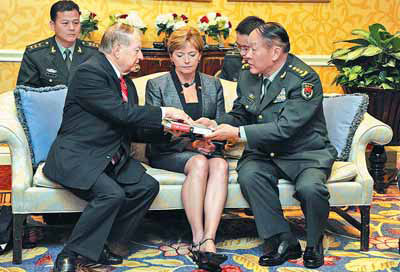Cyber attacks affect 'both nations'
Updated: 2012-05-09 08:07
By Li Xiaokun in Beijing and Tan Yingzi in Washington (China Daily)
|
||||||||
|
J. V. Vinyard, an 88-year-old US World War II veteran, gives a gift to visiting Defense Minister Liang Guanglie. Liang met with representatives of the Flying Tigers, a group of volunteer US military air units that served during the 1940s, as well as their families, on Monday during his visit to the United States. [Wu Qingcai / China News Service] |
The US defense secretary said on Monday that China is also a victim of cyber attacks, after years of accusations of alleged Chinese attacks on the US.
Based on this understanding, the defense ministers of the two nations vowed to work together on cyber security issues to avoid miscalculations that could lead to future crises, after a meeting in the Pentagon marking the first visit by a Chinese defense minister to the US since 2003.
"It's true, as the general pointed out, that obviously there are other countries, actors, others involved in some of the attacks that both of our countries receive," US Defense Secretary Leon Panetta told reporters after the meeting.
"But because the United States and China have developed technological capabilities in this arena, it's extremely important that we work together to develop ways to avoid any miscalculation or misperception that could lead to crisis in this area."
Six months ago, senior US intelligence officials publicly accused China of systematically stealing American high-tech data for its own national economic gain.
It was the most forceful airing of US allegations against Beijing after years of private complaints. China has long said that it has been wronged and that it is also a victim of such attacks.
Defense Minister Liang Guanglie said he and Panetta talked about ways to strengthen cyber security, but they are leaving the details to the experts.
Luo Yuan, deputy secretary-general of the China Association of Military Science, said Panetta's remarks showed "the Pentagon has been more reasonable than before on the cyber attack dispute".
"They have noticed some troubles China is facing in that regard," the major general said. "Cyberspace should be a field of cooperation, not battle, for the two nations."
Given the fact that the US is among the few countries with a cyber war headquarters and troops, Luo said Beijing also expects the US to ensure that it would not impose dangers on China in that regard.
"The US needs to start laying the groundwork for better understanding by the Chinese of what we expect from them in cyberspace," James Lewis, a cyber security expert with the Center for Strategic and International Studies who has met with Chinese officials and scholars for informal discussions, told The Associated Press.
"We want to figure out some way to get some understanding in place before something bad happens."
If there is a cyber incident in China, Lewis said, "we need the Chinese to feel confident that they can call us up and ask, `Was it you?', and get a straight answer."
At the press conference, Liang told reporters that the two sides are committed to building a sound, stable and reliable military-to-military relationship.
"Facing the complicated and serious security situation in the Asia-Pacific, both of us agree that it is in line with our own interests to strengthen the cooperation between the two militaries in order to protect the peace and stability of the region," he said.
Panetta hailed the talk with Liang as "productive".
"The United States and China are both Pacific powers and our relationship is one of the most critical in the world," he said. "We share many interests across the Asia-Pacific region and beyond."
Contact the writers at lixiaokun@chinadaily.com.cn and tanyingzi@chinadailyusa.com
AP contributed to this story.

 Relief reaches isolated village
Relief reaches isolated village
 Rainfall poses new threats to quake-hit region
Rainfall poses new threats to quake-hit region
 Funerals begin for Boston bombing victims
Funerals begin for Boston bombing victims
 Quake takeaway from China's Air Force
Quake takeaway from China's Air Force
 Obama celebrates young inventors at science fair
Obama celebrates young inventors at science fair
 Earth Day marked around the world
Earth Day marked around the world
 Volunteer team helping students find sense of normalcy
Volunteer team helping students find sense of normalcy
 Ethnic groups quick to join rescue efforts
Ethnic groups quick to join rescue efforts
Most Viewed
Editor's Picks

|

|

|

|

|

|
Today's Top News
Health new priority for quake zone
Xi meets US top military officer
Japan's boats driven out of Diaoyu
China mulls online shopping legislation
Bird flu death toll rises to 22
Putin appoints new ambassador to China
Japanese ships blocked from Diaoyu Islands
Inspired by Guan, more Chinese pick up golf
US Weekly

|

|







